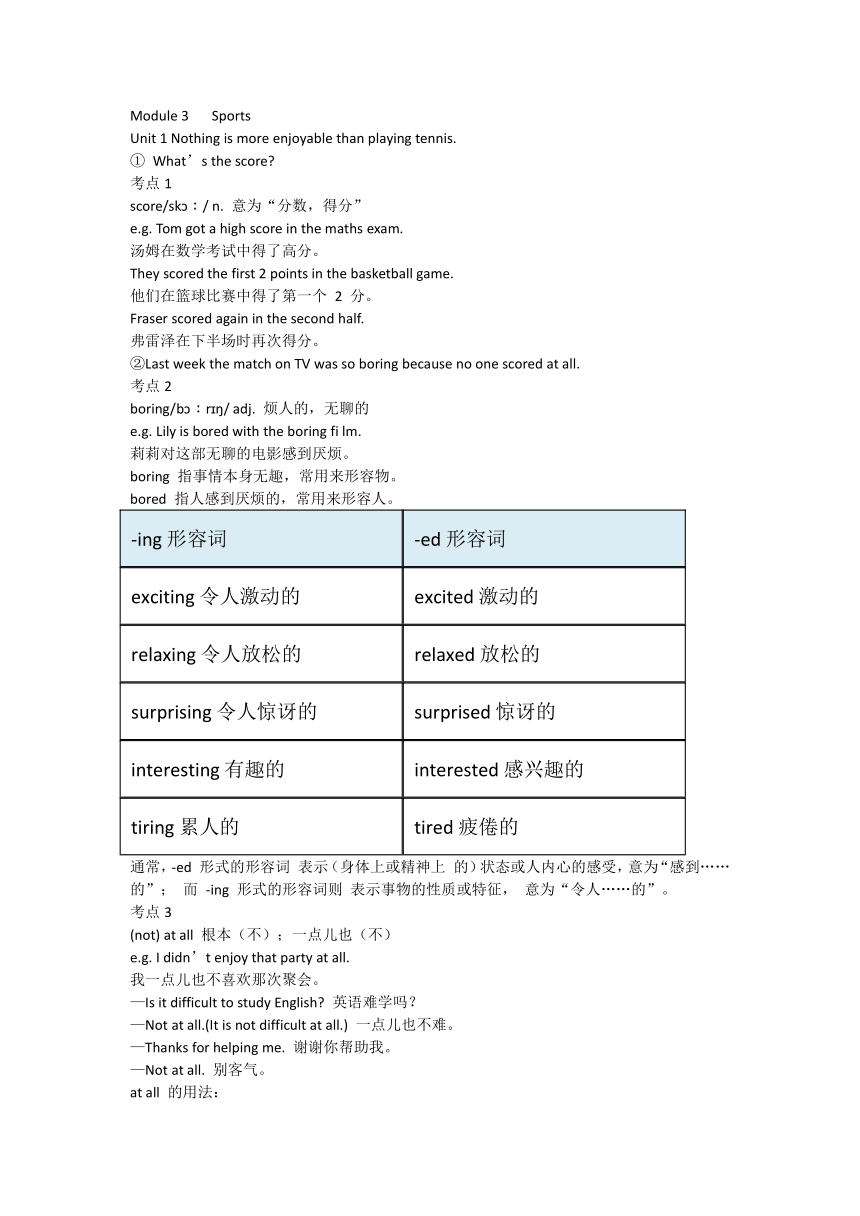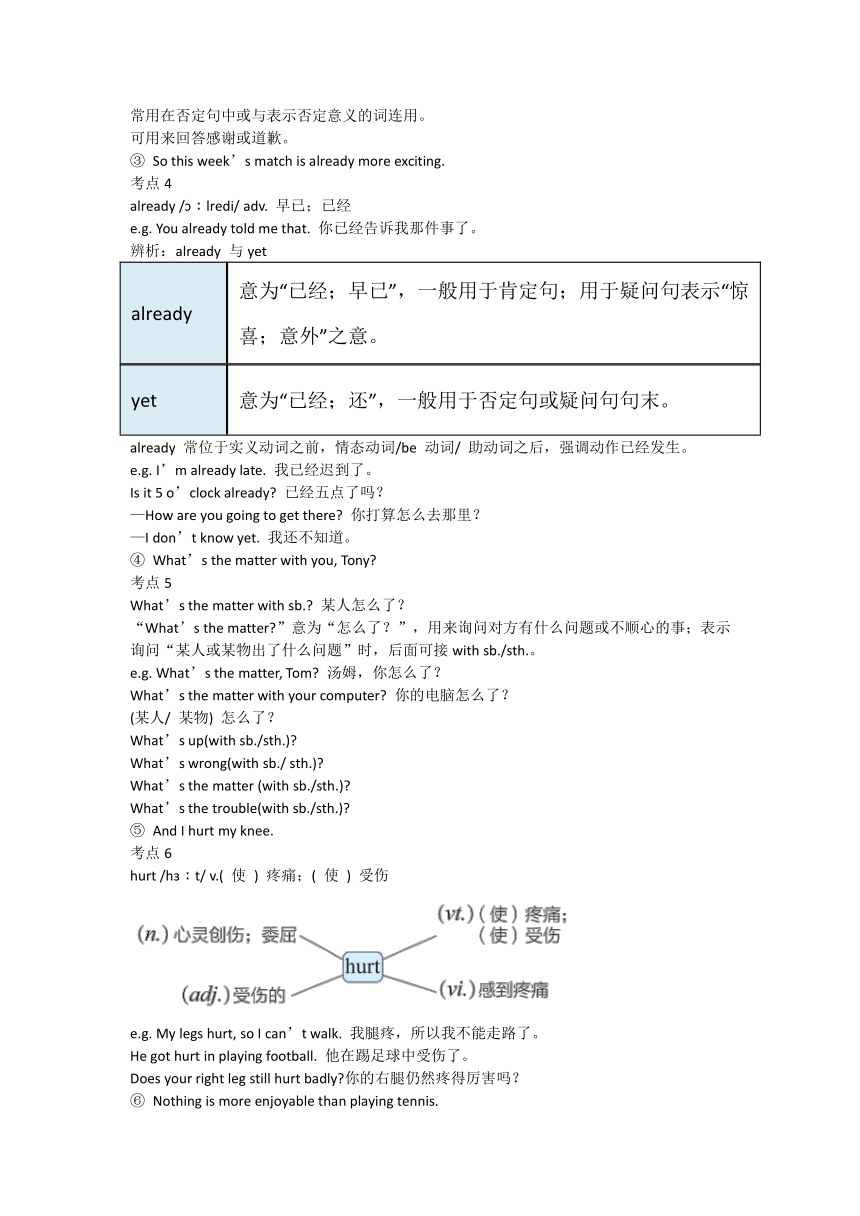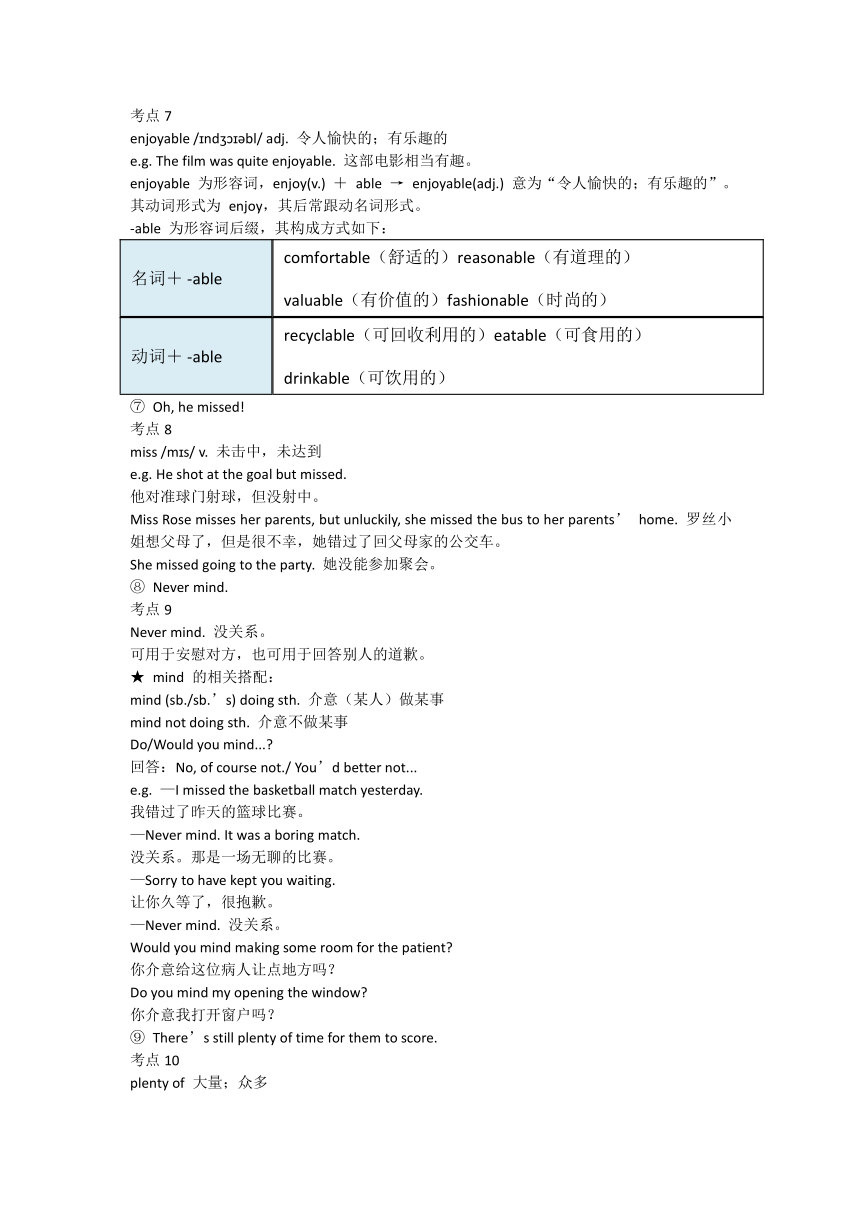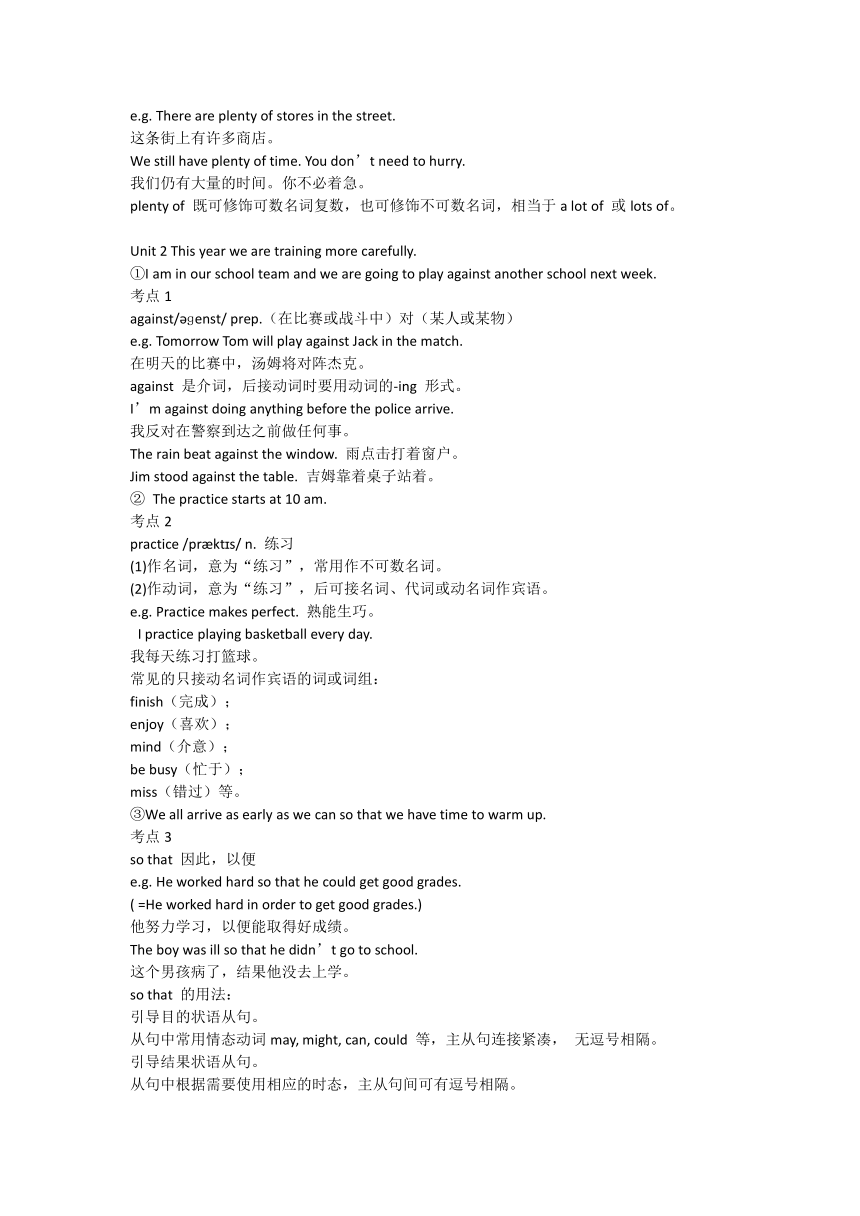Module 3 Sports 知识点讲义
文档属性
| 名称 | Module 3 Sports 知识点讲义 |  | |
| 格式 | docx | ||
| 文件大小 | 82.6KB | ||
| 资源类型 | 教案 | ||
| 版本资源 | 外研版 | ||
| 科目 | 英语 | ||
| 更新时间 | 2023-09-09 07:06:38 | ||
图片预览




文档简介
Module 3 Sports
Unit 1 Nothing is more enjoyable than playing tennis.
① What’s the score
考点1
score/sk / n. 意为“分数,得分”
e.g. Tom got a high score in the maths exam.
汤姆在数学考试中得了高分。
They scored the first 2 points in the basketball game.
他们在篮球比赛中得了第一个 2 分。
Fraser scored again in the second half.
弗雷泽在下半场时再次得分。
②Last week the match on TV was so boring because no one scored at all.
考点2
boring/b r / adj. 烦人的,无聊的
e.g. Lily is bored with the boring fi lm.
莉莉对这部无聊的电影感到厌烦。
boring 指事情本身无趣,常用来形容物。
bored 指人感到厌烦的,常用来形容人。
-ing 形容词 -ed 形容词
exciting 令人激动的 excited 激动的
relaxing 令人放松的 relaxed 放松的
surprising 令人惊讶的 surprised 惊讶的
interesting 有趣的 interested 感兴趣的
tiring 累人的 tired 疲倦的
通常,-ed 形式的形容词 表示(身体上或精神上 的)状态或人内心的感受,意为“感到……的”; 而 -ing 形式的形容词则 表示事物的性质或特征, 意为“令人……的”。
考点3
(not) at all 根本(不);一点儿也(不)
e.g. I didn’t enjoy that party at all.
我一点儿也不喜欢那次聚会。
—Is it difficult to study English 英语难学吗?
—Not at all.(It is not difficult at all.) 一点儿也不难。
—Thanks for helping me. 谢谢你帮助我。
—Not at all. 别客气。
at all 的用法:
常用在否定句中或与表示否定意义的词连用。
可用来回答感谢或道歉。
③ So this week’s match is already more exciting.
考点4
already / lredi/ adv. 早已;已经
e.g. You already told me that. 你已经告诉我那件事了。
辨析:already 与yet
already 意为“已经;早已”,一般用于肯定句;用于疑问句表示“惊喜;意外”之意。
yet 意为“已经;还”,一般用于否定句或疑问句句末。
already 常位于实义动词之前,情态动词/be 动词/ 助动词之后,强调动作已经发生。
e.g. I’m already late. 我已经迟到了。
Is it 5 o’clock already 已经五点了吗?
—How are you going to get there 你打算怎么去那里?
—I don’t know yet. 我还不知道。
④ What’s the matter with you, Tony
考点5
What’s the matter with sb. 某人怎么了?
“What’s the matter ”意为“怎么了?”,用来询问对方有什么问题或不顺心的事;表示询问“某人或某物出了什么问题”时,后面可接with sb./sth.。
e.g. What’s the matter, Tom 汤姆,你怎么了?
What’s the matter with your computer 你的电脑怎么了?
(某人/ 某物) 怎么了?
What’s up(with sb./sth.)
What’s wrong(with sb./ sth.)
What’s the matter (with sb./sth.)
What’s the trouble(with sb./sth.)
⑤ And I hurt my knee.
考点6
hurt /h t/ v.( 使 ) 疼痛;( 使 ) 受伤
e.g. My legs hurt, so I can’t walk. 我腿疼,所以我不能走路了。
He got hurt in playing football. 他在踢足球中受伤了。
Does your right leg still hurt badly 你的右腿仍然疼得厉害吗?
⑥ Nothing is more enjoyable than playing tennis.
考点7
enjoyable / nd bl/ adj. 令人愉快的;有乐趣的
e.g. The film was quite enjoyable. 这部电影相当有趣。
enjoyable 为形容词,enjoy(v.) + able → enjoyable(adj.) 意为“令人愉快的;有乐趣的”。
其动词形式为 enjoy,其后常跟动名词形式。
-able 为形容词后缀,其构成方式如下:
名词+ -able comfortable(舒适的)reasonable(有道理的) valuable(有价值的)fashionable(时尚的)
动词+ -able recyclable(可回收利用的)eatable(可食用的) drinkable(可饮用的)
⑦ Oh, he missed!
考点8
miss /m s/ v. 未击中,未达到
e.g. He shot at the goal but missed.
他对准球门射球,但没射中。
Miss Rose misses her parents, but unluckily, she missed the bus to her parents’ home. 罗丝小姐想父母了,但是很不幸,她错过了回父母家的公交车。
She missed going to the party. 她没能参加聚会。
⑧ Never mind.
考点9
Never mind. 没关系。
可用于安慰对方,也可用于回答别人的道歉。
★ mind 的相关搭配:
mind (sb./sb.’s) doing sth. 介意(某人)做某事
mind not doing sth. 介意不做某事
Do/Would you mind...
回答:No, of course not./ You’d better not...
e.g. —I missed the basketball match yesterday.
我错过了昨天的篮球比赛。
—Never mind. It was a boring match.
没关系。那是一场无聊的比赛。
—Sorry to have kept you waiting.
让你久等了,很抱歉。
—Never mind. 没关系。
Would you mind making some room for the patient
你介意给这位病人让点地方吗?
Do you mind my opening the window
你介意我打开窗户吗?
⑨ There’s still plenty of time for them to score.
考点10
plenty of 大量;众多
e.g. There are plenty of stores in the street.
这条街上有许多商店。
We still have plenty of time. You don’t need to hurry.
我们仍有大量的时间。你不必着急。
plenty of 既可修饰可数名词复数,也可修饰不可数名词,相当于a lot of 或lots of。
Unit 2 This year we are training more carefully.
①I am in our school team and we are going to play against another school next week.
考点1
against/ ɡenst/ prep.(在比赛或战斗中)对(某人或某物)
e.g. Tomorrow Tom will play against Jack in the match.
在明天的比赛中,汤姆将对阵杰克。
against 是介词,后接动词时要用动词的-ing 形式。
I’m against doing anything before the police arrive.
我反对在警察到达之前做任何事。
The rain beat against the window. 雨点击打着窗户。
Jim stood against the table. 吉姆靠着桌子站着。
② The practice starts at 10 am.
考点2
practice /pr kt s/ n. 练习
(1)作名词,意为“练习”,常用作不可数名词。
(2)作动词,意为“练习”,后可接名词、代词或动名词作宾语。
e.g. Practice makes perfect. 熟能生巧。
I practice playing basketball every day.
我每天练习打篮球。
常见的只接动名词作宾语的词或词组:
finish(完成);
enjoy(喜欢);
mind(介意);
be busy(忙于);
miss(错过)等。
③We all arrive as early as we can so that we have time to warm up.
考点3
so that 因此,以便
e.g. He worked hard so that he could get good grades.
( =He worked hard in order to get good grades.)
他努力学习,以便能取得好成绩。
The boy was ill so that he didn’t go to school.
这个男孩病了,结果他没去上学。
so that 的用法:
引导目的状语从句。
从句中常用情态动词may, might, can, could 等,主从句连接紧凑, 无逗号相隔。
引导结果状语从句。
从句中根据需要使用相应的时态,主从句间可有逗号相隔。
考点4
warm up 热身;做准备活动
e.g. If you do not warm up before taking exercise, you may hurt yourself.
如果运动前不做准备活动,你可能会伤着自己。
The party warmed up as soon as he arrived.
他一到,聚会就活跃起来了。
warm up 意为“热身;做准备活动”,是不及物动词短语。
warm up 还可意为“(使) 活跃起来,热情起来”。
④We are training harder than usual because the other team beat us last year.
考点5
train/tre n/ v. 训练,操练
e.g. The university students are training for the boat race.
这些大学生正在为划船比赛进行训练。
(不及物动词)
He trains the Olympic team.
他训练奥林匹克队。(及物动词)
Nowadays China’s high-speed trains are very famous around the world.
如今中国的高铁世界闻名。
考点6
usual /ju l/ adj. 通常的;平常的
e.g. As usual,there weren’t many people at the meeting.
像往常一样,来开会的人并不多。
She got up later than usual. 她起床比平常晚。
usual 的用法:
as usual 像往常一样
than usual 比平常
考点7
beat /bi t/ v.打败,战胜。过去式beat,过去分词beaten。
辨析:beat 与win
beat + 人/ 一个集体(a team,a class,a school 等)e.g. He beat me at chess. 他下棋赢了我。
win + 奖品、奖学金、名誉、财产、战争或运动等e.g. Mary won first place in the competition. 玛丽在竞赛中获得第一名。
e.g. If you beat him, we’ll win this match.
如果你击败他,我们将会赢得这场比赛。
⑤Our coach is pleased because we are playing better as a team now.
考点8
pleased/pli zd/ adj. 高兴的,开心的;满意的
be pleased with sb./sth. 对某人/ 某事感到满意
be pleased at sth. 对某事感到满意
be pleased to 乐意……;因……而高兴
e.g. I’m very pleased with your success.
我对你的成功感到很满意。
He was very pleased at the news.
听到这个消息他感到非常高兴。
I’m very pleased to meet you. 见到你我非常高兴。
⑥Last year we were sometimes careless when we passed the ball and we lost to the other team in the final match.
考点9
careless/ke l s/ adj. 粗心的;疏忽的
e.g. My brother was quite careless, so he made mistakes in spelling in the exam.
我哥哥十分粗心大意,所以在考试中出现了拼写错误。
carelessly adv. 粗心地
↑
careless adj. 粗心的;疏忽的
↑
care v. 关心;在意
↓
careful adj. 小心的;细心的
↓
carefully adv. 小心地;仔细地
考点10
pass/pɑ s/ v. 传递;传送
用于球类运动时,可作及物动词和不及物动词,意为“传球”。
e.g. He passed the ball to Owen. 他把球传给了欧文。
Why do they keep passing back to the goalkeeper
他们为什么总是把球回传给守门员?
考向2
表示“给;递”时,作及物动词。
e.g. Could you please pass me a bottle of Coke (=pass a bottle of Coke to me)
请递给我一瓶可乐,好吗?
pass sb. sth.= pass sth. to sb.
把某物传给某人
⑦ What a pity!
考点11
pity /p ti/ n. 遗憾,同情,可惜,怜悯
pity 的用法:
What a pity !意为“真遗憾啊!”。常用于口语中。
It’s a pity that... 意为 “很遗憾……”。
have pity on 意为 “ 同情,怜悯”。
⑧ That means we have a better chance of winning.
考点12
have a... chance of... 有……的希望
e.g. She has only a slim chance of passing the exam.
她通过考试的希望很渺茫。
He has a chance to win. 他有机会赢。
have a chance of doing sth.
(=have a chance to do sth.) 有机会做某事
by chance 偶然地,意外地
⑨They cheer us on loudly and we feel more confi dent to win the game.
考点14
loudly /la dli/ adv. 响亮地;大声地
loudly 意为“响亮地;大声地”,含有“喧闹”的意味,其比较级为 more loudly,其最高级为 (the) most loudly。
aloud 意为“出声地”,强调“出声”让人听见,但声音并不一定很大。常与 read,say,cry 等词连用,无比较级。
一语辨异:The baby is crying aloud in the bedroom. At the same time, the telephone is ringing loudly.
婴儿正在卧室里大声地哭。与此同时,电话大声地响着。
Unit 3Language in use
① I wanted to choose a sport to keep fit.
考点1
keep fit 意为“保持健康”
e.g. You should eat vegetables to keep fit.
你应该吃蔬菜保持健康。
keep 的固定搭配:
keep away from 远离
keep healthy/fit 保持健康
keep in touch with sb. 和某人保持联系
keep up with 跟上;赶上
②In the mornings and evenings, you can see people jogging in parks or along city streets.
考点2
see sb. doing sth. 看见某人正在做某事
e.g. He often sees the boy stay at home alone.
他经常看见这个男孩独自在家。
He saw the boy crying in his bedroom.
他看见男孩正在自己的卧室里哭。
see sb. do sth. 看见某人做某事
see sb. doing sth. 看见某人正在做某事
③ The more you go jogging, the healthier you will feel.
考点3
“the+ 比较级, the+ 比较级”越……,就越……
The busier he is, the happier he feels.
他越忙,就感觉越高兴。
It becomes warmer and warmer when spring comes.
当春天来临时,天气变得越来越暖和。
形容词比较级 (二)和副词的比较级
考点1
部分双音节和多音节的形容词和副词比较级的构成:
考向1
① 部分双音节词和多音节词,在该词前面加 more 构成比较级。
beautiful—more beautiful
careful—more careful
dangerous—more dangerous
heavily—more heavily
② 由形容词加 -ly 构成的双音节词和多音节词,也是在该词前加 more 构成比较级。
quickly—more quickly
slowly—more slowly
busily—more busily
difficultly—more difficultly
考向2
不规则变化:
原级 比较级
good/well better
bad/ill worse
many/much more
little less
far farther/further
考点2
形容词比较级的特殊用法
比较级+ and +比较级,表示“越来越……”。
e.g. The earth is getting warmer and warmer.
地球正变得越来越暖和。
考向2
“the +比较级,the +比较级”结构表示“越……就越……”。
e.g. The more she thought about it,the more depressed she felt.
她越想这件事就越感到沮丧。
考点3
副词
副词是指在句中表示行为或状态特征的词,用以修饰动词、形容词、其他副词或全句。副词从形式上主要分为以下几种:
(1) 以-ly 结尾的:大多数副词以形容词直接加-ly 构成,这部分副词主要用来修饰动词。如:carefully 细心地;quickly 迅速地;slowly 缓慢地。
(2) 与形容词同形的副词:hard(adj.)硬的,(adv.)努力地;high(adj.)高的,(adv.)高;early(adj.)早的,(adv.)早等。
注意: 形容词与副词的区别:形容词用来修饰名词,在句中作表语、定语和宾语补足语;副词用来修饰动词、形容词或副词。
e.g. It’s terribly cold and I’m feeling terrible.
天气太冷,我感到很不舒服。
考向2
单音节和部分双音节副词的比较级通常在词尾加-er(此类副词不多),以-ly 结尾的副词的比较级通常是在词前加more,反义词是在词前加less。
e.g. hard—harder fast—faster
slowly—more slowly
carefully—more carefully
Unit 1 Nothing is more enjoyable than playing tennis.
① What’s the score
考点1
score/sk / n. 意为“分数,得分”
e.g. Tom got a high score in the maths exam.
汤姆在数学考试中得了高分。
They scored the first 2 points in the basketball game.
他们在篮球比赛中得了第一个 2 分。
Fraser scored again in the second half.
弗雷泽在下半场时再次得分。
②Last week the match on TV was so boring because no one scored at all.
考点2
boring/b r / adj. 烦人的,无聊的
e.g. Lily is bored with the boring fi lm.
莉莉对这部无聊的电影感到厌烦。
boring 指事情本身无趣,常用来形容物。
bored 指人感到厌烦的,常用来形容人。
-ing 形容词 -ed 形容词
exciting 令人激动的 excited 激动的
relaxing 令人放松的 relaxed 放松的
surprising 令人惊讶的 surprised 惊讶的
interesting 有趣的 interested 感兴趣的
tiring 累人的 tired 疲倦的
通常,-ed 形式的形容词 表示(身体上或精神上 的)状态或人内心的感受,意为“感到……的”; 而 -ing 形式的形容词则 表示事物的性质或特征, 意为“令人……的”。
考点3
(not) at all 根本(不);一点儿也(不)
e.g. I didn’t enjoy that party at all.
我一点儿也不喜欢那次聚会。
—Is it difficult to study English 英语难学吗?
—Not at all.(It is not difficult at all.) 一点儿也不难。
—Thanks for helping me. 谢谢你帮助我。
—Not at all. 别客气。
at all 的用法:
常用在否定句中或与表示否定意义的词连用。
可用来回答感谢或道歉。
③ So this week’s match is already more exciting.
考点4
already / lredi/ adv. 早已;已经
e.g. You already told me that. 你已经告诉我那件事了。
辨析:already 与yet
already 意为“已经;早已”,一般用于肯定句;用于疑问句表示“惊喜;意外”之意。
yet 意为“已经;还”,一般用于否定句或疑问句句末。
already 常位于实义动词之前,情态动词/be 动词/ 助动词之后,强调动作已经发生。
e.g. I’m already late. 我已经迟到了。
Is it 5 o’clock already 已经五点了吗?
—How are you going to get there 你打算怎么去那里?
—I don’t know yet. 我还不知道。
④ What’s the matter with you, Tony
考点5
What’s the matter with sb. 某人怎么了?
“What’s the matter ”意为“怎么了?”,用来询问对方有什么问题或不顺心的事;表示询问“某人或某物出了什么问题”时,后面可接with sb./sth.。
e.g. What’s the matter, Tom 汤姆,你怎么了?
What’s the matter with your computer 你的电脑怎么了?
(某人/ 某物) 怎么了?
What’s up(with sb./sth.)
What’s wrong(with sb./ sth.)
What’s the matter (with sb./sth.)
What’s the trouble(with sb./sth.)
⑤ And I hurt my knee.
考点6
hurt /h t/ v.( 使 ) 疼痛;( 使 ) 受伤
e.g. My legs hurt, so I can’t walk. 我腿疼,所以我不能走路了。
He got hurt in playing football. 他在踢足球中受伤了。
Does your right leg still hurt badly 你的右腿仍然疼得厉害吗?
⑥ Nothing is more enjoyable than playing tennis.
考点7
enjoyable / nd bl/ adj. 令人愉快的;有乐趣的
e.g. The film was quite enjoyable. 这部电影相当有趣。
enjoyable 为形容词,enjoy(v.) + able → enjoyable(adj.) 意为“令人愉快的;有乐趣的”。
其动词形式为 enjoy,其后常跟动名词形式。
-able 为形容词后缀,其构成方式如下:
名词+ -able comfortable(舒适的)reasonable(有道理的) valuable(有价值的)fashionable(时尚的)
动词+ -able recyclable(可回收利用的)eatable(可食用的) drinkable(可饮用的)
⑦ Oh, he missed!
考点8
miss /m s/ v. 未击中,未达到
e.g. He shot at the goal but missed.
他对准球门射球,但没射中。
Miss Rose misses her parents, but unluckily, she missed the bus to her parents’ home. 罗丝小姐想父母了,但是很不幸,她错过了回父母家的公交车。
She missed going to the party. 她没能参加聚会。
⑧ Never mind.
考点9
Never mind. 没关系。
可用于安慰对方,也可用于回答别人的道歉。
★ mind 的相关搭配:
mind (sb./sb.’s) doing sth. 介意(某人)做某事
mind not doing sth. 介意不做某事
Do/Would you mind...
回答:No, of course not./ You’d better not...
e.g. —I missed the basketball match yesterday.
我错过了昨天的篮球比赛。
—Never mind. It was a boring match.
没关系。那是一场无聊的比赛。
—Sorry to have kept you waiting.
让你久等了,很抱歉。
—Never mind. 没关系。
Would you mind making some room for the patient
你介意给这位病人让点地方吗?
Do you mind my opening the window
你介意我打开窗户吗?
⑨ There’s still plenty of time for them to score.
考点10
plenty of 大量;众多
e.g. There are plenty of stores in the street.
这条街上有许多商店。
We still have plenty of time. You don’t need to hurry.
我们仍有大量的时间。你不必着急。
plenty of 既可修饰可数名词复数,也可修饰不可数名词,相当于a lot of 或lots of。
Unit 2 This year we are training more carefully.
①I am in our school team and we are going to play against another school next week.
考点1
against/ ɡenst/ prep.(在比赛或战斗中)对(某人或某物)
e.g. Tomorrow Tom will play against Jack in the match.
在明天的比赛中,汤姆将对阵杰克。
against 是介词,后接动词时要用动词的-ing 形式。
I’m against doing anything before the police arrive.
我反对在警察到达之前做任何事。
The rain beat against the window. 雨点击打着窗户。
Jim stood against the table. 吉姆靠着桌子站着。
② The practice starts at 10 am.
考点2
practice /pr kt s/ n. 练习
(1)作名词,意为“练习”,常用作不可数名词。
(2)作动词,意为“练习”,后可接名词、代词或动名词作宾语。
e.g. Practice makes perfect. 熟能生巧。
I practice playing basketball every day.
我每天练习打篮球。
常见的只接动名词作宾语的词或词组:
finish(完成);
enjoy(喜欢);
mind(介意);
be busy(忙于);
miss(错过)等。
③We all arrive as early as we can so that we have time to warm up.
考点3
so that 因此,以便
e.g. He worked hard so that he could get good grades.
( =He worked hard in order to get good grades.)
他努力学习,以便能取得好成绩。
The boy was ill so that he didn’t go to school.
这个男孩病了,结果他没去上学。
so that 的用法:
引导目的状语从句。
从句中常用情态动词may, might, can, could 等,主从句连接紧凑, 无逗号相隔。
引导结果状语从句。
从句中根据需要使用相应的时态,主从句间可有逗号相隔。
考点4
warm up 热身;做准备活动
e.g. If you do not warm up before taking exercise, you may hurt yourself.
如果运动前不做准备活动,你可能会伤着自己。
The party warmed up as soon as he arrived.
他一到,聚会就活跃起来了。
warm up 意为“热身;做准备活动”,是不及物动词短语。
warm up 还可意为“(使) 活跃起来,热情起来”。
④We are training harder than usual because the other team beat us last year.
考点5
train/tre n/ v. 训练,操练
e.g. The university students are training for the boat race.
这些大学生正在为划船比赛进行训练。
(不及物动词)
He trains the Olympic team.
他训练奥林匹克队。(及物动词)
Nowadays China’s high-speed trains are very famous around the world.
如今中国的高铁世界闻名。
考点6
usual /ju l/ adj. 通常的;平常的
e.g. As usual,there weren’t many people at the meeting.
像往常一样,来开会的人并不多。
She got up later than usual. 她起床比平常晚。
usual 的用法:
as usual 像往常一样
than usual 比平常
考点7
beat /bi t/ v.打败,战胜。过去式beat,过去分词beaten。
辨析:beat 与win
beat + 人/ 一个集体(a team,a class,a school 等)e.g. He beat me at chess. 他下棋赢了我。
win + 奖品、奖学金、名誉、财产、战争或运动等e.g. Mary won first place in the competition. 玛丽在竞赛中获得第一名。
e.g. If you beat him, we’ll win this match.
如果你击败他,我们将会赢得这场比赛。
⑤Our coach is pleased because we are playing better as a team now.
考点8
pleased/pli zd/ adj. 高兴的,开心的;满意的
be pleased with sb./sth. 对某人/ 某事感到满意
be pleased at sth. 对某事感到满意
be pleased to 乐意……;因……而高兴
e.g. I’m very pleased with your success.
我对你的成功感到很满意。
He was very pleased at the news.
听到这个消息他感到非常高兴。
I’m very pleased to meet you. 见到你我非常高兴。
⑥Last year we were sometimes careless when we passed the ball and we lost to the other team in the final match.
考点9
careless/ke l s/ adj. 粗心的;疏忽的
e.g. My brother was quite careless, so he made mistakes in spelling in the exam.
我哥哥十分粗心大意,所以在考试中出现了拼写错误。
carelessly adv. 粗心地
↑
careless adj. 粗心的;疏忽的
↑
care v. 关心;在意
↓
careful adj. 小心的;细心的
↓
carefully adv. 小心地;仔细地
考点10
pass/pɑ s/ v. 传递;传送
用于球类运动时,可作及物动词和不及物动词,意为“传球”。
e.g. He passed the ball to Owen. 他把球传给了欧文。
Why do they keep passing back to the goalkeeper
他们为什么总是把球回传给守门员?
考向2
表示“给;递”时,作及物动词。
e.g. Could you please pass me a bottle of Coke (=pass a bottle of Coke to me)
请递给我一瓶可乐,好吗?
pass sb. sth.= pass sth. to sb.
把某物传给某人
⑦ What a pity!
考点11
pity /p ti/ n. 遗憾,同情,可惜,怜悯
pity 的用法:
What a pity !意为“真遗憾啊!”。常用于口语中。
It’s a pity that... 意为 “很遗憾……”。
have pity on 意为 “ 同情,怜悯”。
⑧ That means we have a better chance of winning.
考点12
have a... chance of... 有……的希望
e.g. She has only a slim chance of passing the exam.
她通过考试的希望很渺茫。
He has a chance to win. 他有机会赢。
have a chance of doing sth.
(=have a chance to do sth.) 有机会做某事
by chance 偶然地,意外地
⑨They cheer us on loudly and we feel more confi dent to win the game.
考点14
loudly /la dli/ adv. 响亮地;大声地
loudly 意为“响亮地;大声地”,含有“喧闹”的意味,其比较级为 more loudly,其最高级为 (the) most loudly。
aloud 意为“出声地”,强调“出声”让人听见,但声音并不一定很大。常与 read,say,cry 等词连用,无比较级。
一语辨异:The baby is crying aloud in the bedroom. At the same time, the telephone is ringing loudly.
婴儿正在卧室里大声地哭。与此同时,电话大声地响着。
Unit 3Language in use
① I wanted to choose a sport to keep fit.
考点1
keep fit 意为“保持健康”
e.g. You should eat vegetables to keep fit.
你应该吃蔬菜保持健康。
keep 的固定搭配:
keep away from 远离
keep healthy/fit 保持健康
keep in touch with sb. 和某人保持联系
keep up with 跟上;赶上
②In the mornings and evenings, you can see people jogging in parks or along city streets.
考点2
see sb. doing sth. 看见某人正在做某事
e.g. He often sees the boy stay at home alone.
他经常看见这个男孩独自在家。
He saw the boy crying in his bedroom.
他看见男孩正在自己的卧室里哭。
see sb. do sth. 看见某人做某事
see sb. doing sth. 看见某人正在做某事
③ The more you go jogging, the healthier you will feel.
考点3
“the+ 比较级, the+ 比较级”越……,就越……
The busier he is, the happier he feels.
他越忙,就感觉越高兴。
It becomes warmer and warmer when spring comes.
当春天来临时,天气变得越来越暖和。
形容词比较级 (二)和副词的比较级
考点1
部分双音节和多音节的形容词和副词比较级的构成:
考向1
① 部分双音节词和多音节词,在该词前面加 more 构成比较级。
beautiful—more beautiful
careful—more careful
dangerous—more dangerous
heavily—more heavily
② 由形容词加 -ly 构成的双音节词和多音节词,也是在该词前加 more 构成比较级。
quickly—more quickly
slowly—more slowly
busily—more busily
difficultly—more difficultly
考向2
不规则变化:
原级 比较级
good/well better
bad/ill worse
many/much more
little less
far farther/further
考点2
形容词比较级的特殊用法
比较级+ and +比较级,表示“越来越……”。
e.g. The earth is getting warmer and warmer.
地球正变得越来越暖和。
考向2
“the +比较级,the +比较级”结构表示“越……就越……”。
e.g. The more she thought about it,the more depressed she felt.
她越想这件事就越感到沮丧。
考点3
副词
副词是指在句中表示行为或状态特征的词,用以修饰动词、形容词、其他副词或全句。副词从形式上主要分为以下几种:
(1) 以-ly 结尾的:大多数副词以形容词直接加-ly 构成,这部分副词主要用来修饰动词。如:carefully 细心地;quickly 迅速地;slowly 缓慢地。
(2) 与形容词同形的副词:hard(adj.)硬的,(adv.)努力地;high(adj.)高的,(adv.)高;early(adj.)早的,(adv.)早等。
注意: 形容词与副词的区别:形容词用来修饰名词,在句中作表语、定语和宾语补足语;副词用来修饰动词、形容词或副词。
e.g. It’s terribly cold and I’m feeling terrible.
天气太冷,我感到很不舒服。
考向2
单音节和部分双音节副词的比较级通常在词尾加-er(此类副词不多),以-ly 结尾的副词的比较级通常是在词前加more,反义词是在词前加less。
e.g. hard—harder fast—faster
slowly—more slowly
carefully—more carefully
同课章节目录
- Module 1 How to learn English
- Unit 1 Let's try to speak English as much as possi
- Unit 2 You should smile at her.
- Unit 3 Language in use .
- Module 2 My home town and my country
- Unit 1 It's taller than many other buildings.
- Unit 2 Cambridge is a beautiful city in the east o
- Unit 3 Language in use .
- Module 3 Sports.
- Unit 1 Nothing is more exciting than playing tenni
- Unit 2 This year we training more carefully.
- Unit 3 Language in use .
- Module 4 Planes, ships and trains .
- Unit 1 He lives the farthest from school.
- Unit 2 What is the best way to travel.
- Unit 3 Language in use .
- Module 5 Lao She Teahouse.
- Unit 1 I wanted to see the Beijing Opera.
- Unit 2 It descibes the changes in Chinese society.
- Unit 3 Language in use .
- Module 6 Animals in danger.
- Unit 1 It allows people to get closer to them .
- Unit 2 The WWF is working hard to save them all.
- Unit 3 Language in use .
- Revision module A
- Module 7 A famous story
- Unit 1 Alice was sitting with her sister by the ri
- Unit 2 She was thinking about her cat.
- Unit 3 Language in use .
- Module 8 Accidents
- Unit 1 While the car were changing to red, a car s
- Unit 2 I was trying to pick it up when it bite me
- Unit 3 Language in use .
- Module 9 Population
- Unit 1 The population of China is about 1.37 billi
- Unit 2 Arnwick was a city with 200,000 people.
- Unit 3 Language in use .
- Module 10 The weathe
- Unit 1 It might snow.
- Unit 2 The weather is fine all year round.
- Unit 3 Language in use .
- Module 11 Way of life
- Unit 1 In China ,we open a gift later.
- Unit 2 In England, you usually drink tea with milk
- Unit 3 Language in use .
- Module 12 Help
- Unit 1 What should we do before help arrives?
- Unit 2 Stay away from windows and heavy furniture.
- Unit 3 Language in use .
- Revision module B
